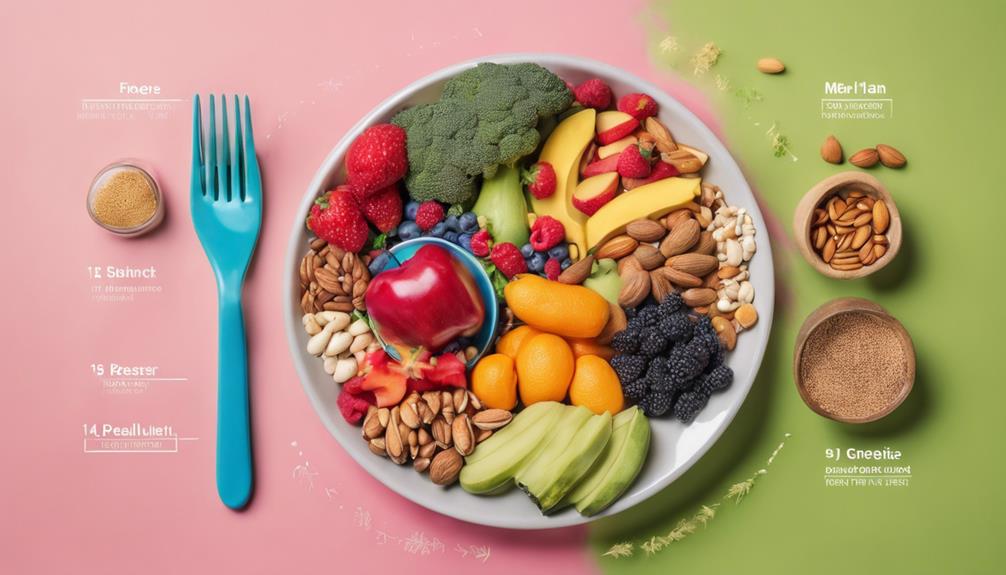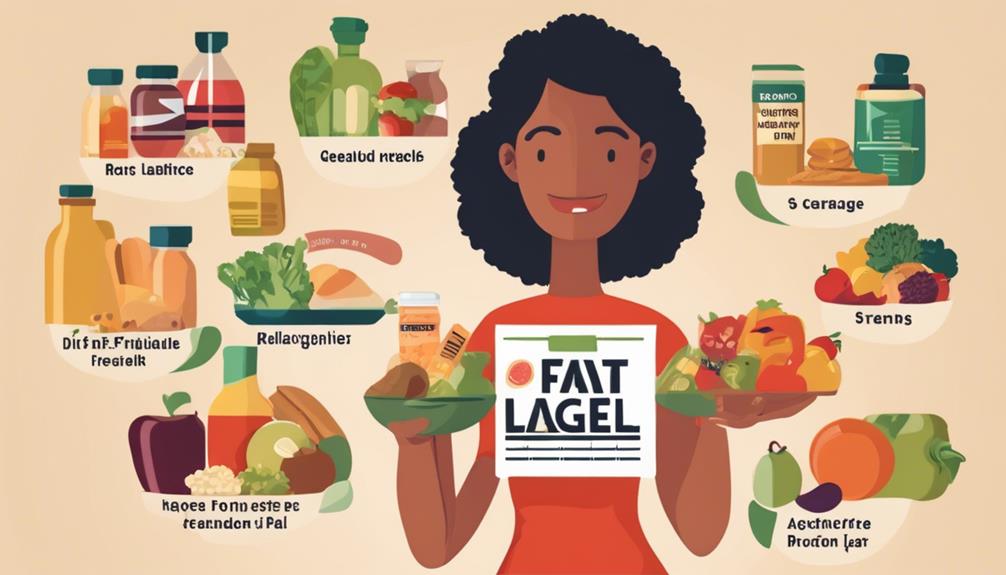Creating a Balanced Diet Plan
When planning your meals, it's crucial to consider a balanced diet that includes a variety of nutrients essential for your health. But how do you determine the right mix of foods and portions to achieve this balance? By understanding the significance of each food group and the impact they have on your overall well-being, you can start creating a roadmap towards a healthier lifestyle. Let's explore some practical strategies and tips to help you navigate the world of nutrition and build a sustainable diet plan that works for you.
Key Takeaways
- Include a variety of food groups for essential nutrients.
- Balance macronutrients like protein, carbs, and fats.
- Incorporate fiber-rich foods for digestion and fullness.
- Stay hydrated with water for optimal bodily functions.
- Seek professional guidance for personalized diet plans.
Importance of Balanced Diet
Understanding the importance of a balanced diet is essential for maintaining optimal health and well-being. A balanced diet provides the necessary nutrients for your body to function efficiently, supporting processes like nutrient absorption and maintaining steady energy levels throughout the day. Nutrient absorption is crucial for your body to utilize vitamins, minerals, and other essential compounds effectively. Without a balanced diet, nutrient deficiencies can occur, leading to various health issues.
Moreover, a balanced diet plays a significant role in regulating your energy levels. By consuming a variety of foods from different food groups, you ensure that your body receives a steady supply of energy throughout the day.
Balanced meals containing carbohydrates, proteins, fats, vitamins, and minerals help sustain your energy levels, promoting alertness and productivity.
Incorporating a diverse range of foods into your daily meals is key to supporting nutrient absorption and maintaining optimal energy levels. By prioritizing a balanced diet, you can enhance your overall health and well-being.
Understanding Macronutrients
Macronutrients are the essential components of your diet that provide the energy needed for daily activities. Protein sources are crucial for muscle repair and growth. Include lean meats like chicken, turkey, and fish, as well as plant-based options such as beans, lentils, and tofu.
Carbohydrate sources are vital for providing quick energy. Opt for whole grains like brown rice, quinoa, and oats, along with fruits and vegetables that offer essential vitamins and minerals. Be mindful of the types of carbohydrates you consume, prioritizing complex carbs over simple sugars.
Balancing your macronutrient intake is key to sustaining energy levels throughout the day. Remember to personalize your choices based on your individual needs and preferences. By incorporating a variety of protein and carbohydrate sources into your meals, you can create a well-rounded diet that supports your overall health and well-being.
Incorporating Fiber-Rich Foods
To enhance the nutritional quality of your diet, incorporating fiber-rich foods is crucial. Fiber plays a significant role in promoting gut health by supporting regular bowel movements and maintaining a healthy digestive system. Including a variety of fiber sources such as fruits, vegetables, whole grains, legumes, and nuts in your meals can contribute to a balanced diet plan that prioritizes your overall well-being.
Moreover, fiber-rich foods can aid in weight management by providing a feeling of fullness, which may help you consume fewer calories throughout the day. This can be beneficial for those looking to maintain or achieve a healthy weight.
Additionally, high-fiber foods often have lower energy density, meaning they provide fewer calories per gram, making them a great choice for satiety without excess calories.
Importance of Hydration
Hydration is often overlooked but plays a crucial role in maintaining optimal bodily functions and overall health. Proper hydration offers numerous benefits that go beyond just quenching thirst. Here are three key reasons why staying hydrated is essential for your well-being:
- Improved Physical Performance: Adequate hydration is vital for optimal physical performance. Whether you're hitting the gym or engaging in daily activities, staying hydrated helps maintain endurance, strength, and coordination.
- Enhanced Cognitive Function: Hydration is closely linked to brain function. Dehydration can lead to cognitive impairment, affecting concentration, alertness, and overall mental performance. By keeping yourself hydrated, you support your brain's ability to function at its best.
- Supports Digestion and Detoxification: Water plays a crucial role in digestion and the removal of waste from the body. Sufficient hydration aids in nutrient absorption, smooth digestion, and helps flush out toxins.
To maintain proper hydration, aim to follow water intake guidelines that recommend around 8-10 cups of water per day for most individuals. Remember, staying hydrated is a simple yet powerful way to support your body's functions and overall health.
Role of Vitamins and Minerals
Vitamins and minerals are essential micronutrients that play a crucial role in maintaining overall health and well-being. These nutrients are vital for various bodily functions, including nutrient absorption, immune system support, and energy production. Ensuring an adequate intake of vitamins and minerals is key to promoting optimal health and preventing deficiencies that can lead to various health issues.
Nutrient absorption is facilitated by certain vitamins and minerals, such as vitamin D, calcium, and iron. These nutrients help the body absorb and utilize other essential nutrients from the foods you consume, ensuring that your body functions properly.
While a well-balanced diet is the best way to obtain vitamins and minerals, sometimes dietary supplements may be necessary to meet your body's needs. It's important to consult with a healthcare provider or a registered dietitian before starting any dietary supplements, as they can provide personalized recommendations based on your individual nutritional requirements. Remember, a varied diet rich in fruits, vegetables, whole grains, lean proteins, and healthy fats is the foundation for obtaining essential vitamins and minerals.
Mindful Eating Practices
One effective approach to improving your relationship with food and promoting healthy eating habits is through mindful eating practices. By incorporating mindful portioning and intuitive eating into your routine, you can develop a more balanced and sustainable approach to food consumption.
Here are three key aspects of mindful eating practices that can help you achieve a healthier relationship with food:
- Mindful Portioning: Paying attention to portion sizes can prevent overeating and promote better digestion. Try using smaller plates, measuring your food, and being mindful of serving sizes to avoid consuming more than your body needs.
- Intuitive Eating: Listen to your body's hunger and fullness cues. Eat when you're hungry and stop when you're satisfied, rather than relying on external cues or strict meal schedules.
- Engage Your Senses: Slow down and savor each bite, paying attention to the flavors, textures, and smells of your food. This can enhance your eating experience and help you appreciate your meals more fully.
Healthy Snack Options
To continue fostering a healthier relationship with food and sustaining balanced eating habits, exploring nutritious and satisfying snack options can be a beneficial addition to your daily routine. Opting for nutrient-dense choices in appropriate portion sizes can help keep your energy levels up and avoid mindless overeating. Here are some snack options to consider:
| Nutrient-Dense Snacks | Portion Size |
|---|---|
| Greek Yogurt with Berries | 1 cup yogurt, 1/2 cup berries |
| Hummus with Carrot Sticks | 2 tbsp hummus, 1 cup carrot sticks |
| Almonds and Dried Fruit | 1/4 cup almonds, 1/4 cup dried fruit |
| Whole Grain Crackers with Cheese | 5 crackers, 1 slice cheese |
These options provide a balance of protein, healthy fats, and carbohydrates to keep you satisfied between meals. Remember to listen to your body's hunger cues and choose snacks mindfully. Prioritize quality over quantity when selecting your snacks to support your overall well-being.
Portion Control Strategies
Exploring effective portion control strategies can significantly impact your ability to maintain a balanced diet. By incorporating mindful eating practices and plate portioning techniques, you can better manage your food intake and promote overall health. Here are some strategies to help you control your portions effectively:
- Practice Mindful Eating: Engage all your senses while eating, savor each bite, and pay attention to your body's hunger and fullness cues. This can help prevent overeating and promote a healthier relationship with food.
- Use Plate Portioning: Divide your plate into sections for different food groups such as vegetables, proteins, and whole grains. This visual cue can guide you in creating a balanced meal and prevent oversized portions of any one food group.
- Avoid Distractions: When eating, focus on your meal without distractions like TV or phones. This can help you tune into your body's signals and prevent mindless overeating.
Balancing Different Food Groups
When creating a balanced diet plan, incorporating various food groups in the right proportions is essential for optimal nutrition and overall health. Protein sources play a crucial role in muscle repair and growth, as well as in supporting a healthy immune system. Include lean sources like chicken, turkey, tofu, legumes, and fish in your meals.
Healthy fats are also vital for brain health, hormone production, and nutrient absorption. Incorporate sources such as avocados, nuts, seeds, and olive oil into your diet.
Remember that balance is key. Aim to include a variety of fruits and vegetables rich in vitamins, minerals, and antioxidants. Whole grains like quinoa, brown rice, and oats provide fiber and sustained energy.
Dairy or dairy alternatives offer calcium for bone health. By diversifying your food choices and ensuring you include protein sources and healthy fats in your meals, you can create a well-rounded diet plan that supports your overall well-being.
Meal Prepping Tips
Considering meal prepping can significantly streamline your eating habits, allowing you to save time and make healthier choices throughout the week. To make the most out of your meal prepping experience, keep in mind the following tips:
- Time Management: Set aside specific days for meal prepping, such as Sundays or Wednesdays, to ensure you have meals ready for the upcoming week. This way, you can save time during busy weekdays and avoid the temptation of opting for less nutritious fast food options.
- Ingredient Variety: Incorporate a diverse range of ingredients in your meal prepping to ensure you're getting a wide array of nutrients. Including various fruits, vegetables, lean proteins, whole grains, and healthy fats not only enhances the nutritional quality of your meals but also keeps your taste buds excited.
- Portion Control: Use portion-sized containers to divide your meals accordingly. This practice not only helps in managing your caloric intake but also saves time during hectic mornings when you simply need to grab a pre-portioned meal and go.
Reading Food Labels
To further support your journey towards a balanced diet plan, understanding how to interpret food labels is a valuable skill that can empower you to make informed choices about the foods you consume. Label decoding involves looking beyond the flashy marketing claims and focusing on the nutritional analysis provided on the label. Here is a simple guide to help you navigate food labels effectively:
| Nutrient | Daily Value (%DV) |
|---|---|
| Total Fat | 20% |
| Saturated Fat | 10% |
| Cholesterol | 5% |
| Sodium | 15% |
Seeking Professional Guidance
For personalized guidance on developing a balanced diet plan tailored to your specific needs and goals, seeking professional assistance from a registered dietitian or nutritionist is highly recommended. A dietitian consultation can provide you with a personalized plan that takes into account your unique dietary requirements and health objectives.
Here are three key benefits of seeking professional guidance:
- Expertise: A registered dietitian or nutritional coach has the knowledge and training to offer evidence-based advice on nutrition and dietary choices.
- Customized Advice: Professionals in the field can tailor recommendations to suit your individual preferences, lifestyle, and any existing health conditions.
- Accountability and Support: Working with a dietitian or nutritionist provides ongoing encouragement, motivation, and accountability to help you stay on track with your diet plan.
Frequently Asked Questions
Can I Still Enjoy Occasional Treats in a Balanced Diet?
Yes, you can still enjoy occasional treats in a balanced diet. Moderating indulgences and balancing splurges is key. Incorporate treats mindfully, focusing on quality over quantity. Remember, it's about overall balance and enjoyment in your eating habits.
How Can I Prevent Food Cravings While Following a Balanced Diet?
To prevent food cravings, focus on mindful eating. Engage your senses, chew slowly, and savor each bite. Keep healthy substitutions like fruits and nuts handy. Stay hydrated and ensure balanced meals to curb cravings.
Are There Specific Foods That Can Help Boost Metabolism?
To boost metabolism, try incorporating metabolism-boosting foods like green tea, chili peppers, and lean proteins into your diet. Snack on nutrient-rich options such as nuts, seeds, and Greek yogurt to keep your energy levels stable throughout the day.
What Are Some Tips for Dining Out While Maintaining a Balanced Diet?
When dining out, choose healthy options like grilled lean proteins or salads. Practice portion control by sharing entrees or opting for appetizers. Be mindful of dressings and sauces. Enjoy your meal without sacrificing your balanced diet.
How Can I Address Emotional Eating Habits in My Diet Plan?
Address emotional eating by prioritizing stress management techniques, such as deep breathing or mindfulness practices. Practice mindful eating to connect with your body's hunger cues. Seek support from a counselor or dietitian for personalized strategies tailored to your needs.
Conclusion
In conclusion, have you considered how a balanced diet plan can positively impact your overall health and well-being? By incorporating a variety of foods from all food groups, focusing on portion control, and staying hydrated, you can ensure that your body receives the necessary nutrients it needs to function properly. Remember to consult with a nutrition professional for personalized guidance and support on your journey to a healthier lifestyle. Your body deserves to be nourished with care and intention.















